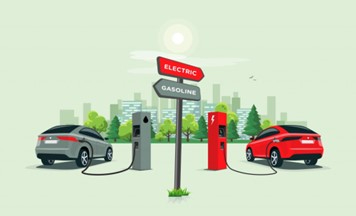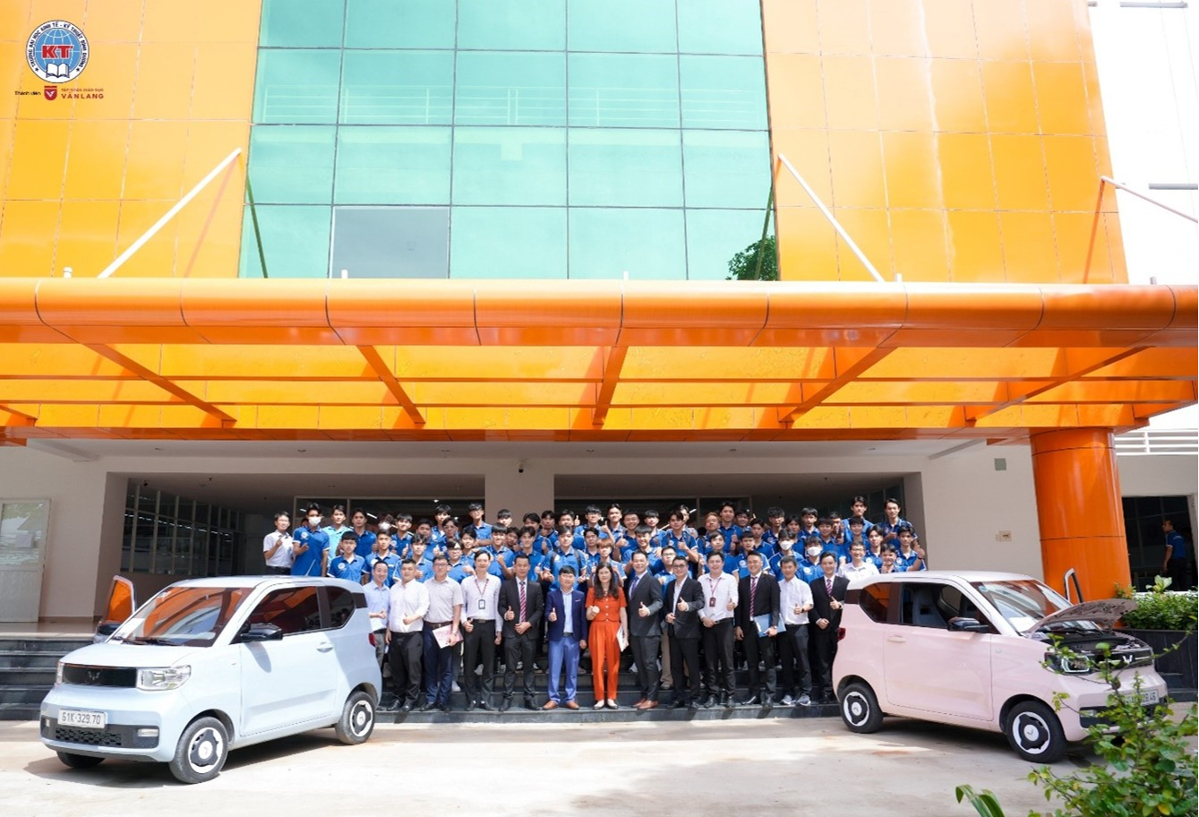
Current trends and future prospects for electric vehicles worldwide
- The cost of electric vehicles is gradually decreasing due to advancements in battery technology and reductions in production costs. This trend makes electric vehicles more accessible to the general public.
- Charging infrastructure is being expanded to meet the growing demand from electric vehicle users. Governments and corporations are heavily investing in the development of charging networks, providing greater convenience for people to travel using electric vehicles.
- Additionally, the range of electric vehicles has significantly improved thanks to the efforts of automakers. Optimized battery technology extends usage time per charge, addressing concerns about battery depletion during travel.
The global electric vehicle industry is thriving, driven by several key factors:
- The growing urgency of environmental protection

Confronting challenges from climate change, environmental pollution, and natural resource depletion, the Earth faces a critical state that demands immediate intervention.
Environmental protection is not just the responsibility of a single nation but a collective duty of humanity. Actions, even as small as saving energy, utilizing renewable resources, or minimizing the use of harmful materials, can contribute significantly. Reducing waste and adopting sustainable practices are essential for a greener planet.
Furthermore, political decisions and policies from governments and international organizations play a crucial role. Legal and economic measures can promote the adoption of eco-friendly technologies and transport solutions, limit the overexploitation of natural resources, and ensure effective waste management.
To change societal attitudes and actions toward environmental protection, consensus and cooperation from all sectors are required. Building a sense of community and raising awareness about the importance of protecting the environment are foundational steps toward a cleaner, greener future.
- Significant reductions in lithium-ion battery costs and government support

In recent years, lithium-ion battery technology has seen remarkable advancements in manufacturing and storage, leading to considerable cost reductions. This progress has paved the way for more affordable electric vehicles, attracting interest from both consumers and automakers.
Improvements in lithium-ion battery technology have enhanced performance and operational efficiency. These batteries offer high energy storage capacity and long lifespans, enabling electric vehicles to travel longer distances with faster charging times. This serves as a strong motivation for the global development and adoption of electric vehicle technology.
- Increased consumer awareness of electric vehicle benefits

Mini EV electric car dealer, Wuling Binh Duong signed a cooperation agreement with Binh Duong University of Economics and Technology
- The electric vehicle sector is experiencing rapid global growth, driven by heightened consumer awareness of its advantages.
- Rising oil prices and concerns about climate change have intensified interest in clean, environmentally friendly transportation solutions. Electric vehicles represent a leading choice for reducing emissions and air pollution while decreasing reliance on fossil fuels.
- Moreover, users appreciate the operational benefits of electric vehicles, such as lower maintenance costs, reduced noise levels, and performance metrics approaching those of traditional vehicles. The development of infrastructure, including fast-charging stations and smart grid systems, has further facilitated the adoption of electric vehicles globally.
Development Status:
Electric vehicle sales have surged in recent years.
Global electric vehicle sales reached 4.2 million units in 2022, doubling from 2021, according to IEA reports. This figure is expected to grow exponentially, reaching 66 million units by 2027 and 280 million units by 2030[1].
Traditional automakers like Volkswagen, Ford, Hyundai, and Kia are investing billions of dollars in electric vehicle development, offering a wide range of models from mid-range to luxury.
Meanwhile, major battery manufacturers such as LG Chem, CATL, Panasonic, BYD, and Samsung SDI are expanding production capacities to meet rising demand. Innovations in the next-generation lithium-ion and solid-state batteries are being pursued to enhance performance and lower costs.
Benefits of Electric Vehicles:
The electric vehicle industry is witnessing robust global growth, driven by its numerous environmental and consumer benefits.
- First and foremost, electric vehicles contribute significantly to environmental preservation. By producing zero emissions, they help reduce air pollution, greenhouse effects, and noise, while minimizing resource exploitation.
- Second, they offer cost advantages, including lower operational and maintenance expenses. Beyond environmental friendliness, electric vehicles generate minimal noise, providing peace and comfort for users and surrounding communities.
- Additionally, their high performance and convenience, including at home or public charging, are highly valued. Advancements in technology have made electric vehicles increasingly comfortable, safe, and suited to modern consumer needs.
State Policies:
- Decision No. 1168/QD-TTg dated July 16, 2014, issued by the Prime Minister, clearly outlines the strategy for developing Vietnam's automobile industry by 2025, with a vision to 2035 as follows: "Leverage the internal strength of all economic sectors within the country; prioritize connections and collaboration with major global automobile manufacturing corporations to develop the automobile industry in harmony with transportation infrastructure development, effectively meeting domestic demand for competitive automobile types that align with consumption policies and requirements for environmental protection and energy efficiency. Enhance competitiveness to become a supplier of components and spare parts in the global automobile manufacturing chain, creating momentum to drive the economic restructuring of the entire country toward modernization." Additionally, the orientation for Vietnam's automobile industry is specified as: "Identify and establish strategic partnerships, encourage investment in sufficiently large projects to create a market for supporting industries. Promote the production of environmentally friendly vehicles (fuel-efficient cars, hybrid cars, biofuel-powered cars, electric cars, etc.), ensuring compliance with emission standards according to the roadmap approved by the Prime Minister."
- According to Decree No. 10/2022/ND-CP dated January 15, 2022, the Government has approved a roadmap to support registration fees for people using electric cars for 5 years, starting from March 1, 2022. 2022. Specifically, electric cars have an initial registration fee of 0% within 3 years. In the next 2 years, this fee will be 50% of the fee for gasoline and diesel cars with the same number of seats.
- To stimulate the production and consumption of battery-powered electric vehicles, on January 11, 2022, the 15th National Assembly passed Law No. 03/2022/QH15, amending and supplementing several provisions of the Public Investment Law, the Law on Investment under the Public-Private Partnership model, the Investment Law, the Housing Law, the Bidding Law, the Electricity Law, the Enterprise Law, the Special Consumption Tax Law, and the Civil Judgment Enforcement Law. This law adjusts the special consumption tax rate for electric vehicles to 1–3% (effective from March 1, 2022, to February 28, 2027) and 4–11% (effective from March 1, 2027).
The Position and Contribution of Electric Vehicles in Vietnam
The electric vehicle industry, though nascent, is rapidly expanding globally. BloombergNEF predicts global sales of 5.9 million electric vehicles in 2023, a 63% increase from 2022. In Vietnam, the electric vehicle market is also flourishing. According to the Vietnam Automobile Manufacturers Association (VAMA), 10,368 electric vehicles were sold in 2022, marking a 222% year-on-year increase[2].
Although the sector employs only about 30,000 workers, its GDP contribution is substantial. Statistics from the General Statistics Office show that the electric vehicle industry accounted for 0.4% of Vietnam’s GDP in 2023, surpassing several traditional industries.
By August 2023, nearly 3,000 electric vehicles had been produced, assembled, or imported nationwide. VAMA forecasts that Vietnam will reach 1 million electric vehicles by 2028 and approximately 3.5 million by 2040.
Conclusion:
The electric vehicle industry holds immense potential and represents an inevitable future trend. Electric vehicles offer significant environmental and consumer benefits. However, challenges remain to make them more widespread.
[1] https://www.iea.org/reports/global-ev-outlook-2023
[2] https://tuoitre.vn/doanh-so-thi-truong-xe-dien-viet-nam-nam-2023-co-the-tang-gap-doi-20230807162338095.htm